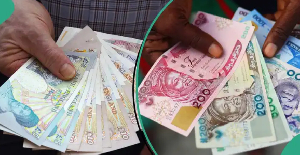Report by Inclusion for all Initiative has said 54.2 per cent of Nigeria’s unbanked poor indicated their preference for saving their money in a safe place at home or carrying it around than depositing the funds in bank.
The Inclusion for all Initiative is a multifaceted advocacy programme that seeks to address the barriers that prevent the financial and economic inclusion of Nigeria’s poorest and most vulnerable communities.
The report indicated that more than 50 per cent of this segment of the population could lose their savings if they are unable to exchange old notes for new notes in line with the Central Bank of Nigeria (CBN) naira redesign timeline.
On October 25, the CBN announced plans to redesign the 200, 500 and 1000 naira notes which took effect from December 15, 2022. While circulation of the newly designed notes continues, the old notes will remain in circulation until January 31, 2023.
The Inclusion for all Initiative said conditions for exchange of old naira notes could disproportionately impact vulnerable populations.
The group’s data suggests that Nigeria’s most vulnerable groups could be adversely affected by the decision to require the exchange of old Naira notes for new notes through an existing bank account.
Head, Inclusion for all Initiative, Chinasa Collins-Ogbuo, said: “While we commend the Central Bank for its commitment to the digitisation of Nigeria’s financial services sector, we have to design policy to ensure that it is suitable for the most vulnerable parts of society.”
According to the 2020 EFInA Access to Finance (A2F) Survey, there are more than 38 million Nigerians without a bank account, and our research indicates that more than 50 per cent of these people prefer to save in cash.
“Unbanked Nigerians face a range of barriers to enter the financial system, from access to identity, a lack of proximity to financial access points and a lack of trust in the system. These barriers must be considered and addressed in the Naira redesign process if we are to ensure that this process supports financial inclusion, and does not further marginalise already vulnerable communities,” Collins-Ogbuo said.
According to him, the CBN has acknowledged concerns around vulnerable populations, and prioritised banking agents to help those in rural/underserved areas to deposit cash.
“However, agents are concentrated in urban areas – far away from vulnerable populations. With a 20 per cent agent coverage target for the northern regions, the Northeast is only at 6.3 per cent, with Northcentral at 15.5 per cent and Northwest at 12 per cent. Challenges cited include insecurity, distance, lack of electricity, and low profits,” he added.
Speaking on the Inclusion for all podcast on the Naira Redesign Professor Yinka David-West, Associate Dean, Lagos Business School, said: “From the supply side, we need to ask, ‘Is this a push or pull initiative?.’ I’ll compare the naira redesign to the National Identification Number (NIN) registration, which was a push directive. All that is required is linking the NIN to a SIM and BVN to facilitate bank transactions.
“Many Nigerians treasure their phones more than their bank accounts. How can we incorporate seamless banking to fit the lifestyle of Nigerians? Through the naira redesign, the CBN is promoting a cashless system with secure and seamless transactions as a means to facilitate financial inclusion,” she said.
The group also provided recommendations for action to ensure that vulnerable populations are able to participate and secure the associated benefits of access to digital financial services.
It said the extension of the time period to exchange Naira notes should be seriously considered in order to enable a rapid and intensified rollout of a sensitisation programme among vulnerable groups, informing them of the process, deadlines and requirements.
It will also adequately equip, incentivise and capacitate mobile agents to reach and cover people in hard-to-reach areas effectively.
“The extension of existing enrolment locations for NIN and Bank Verification Number to ensure that vulnerable populations without the documentation for basic Know Your Customer are able to secure it prior to the deadline.
“The requirement by the CBN for individuals to have full KYC and deposit their old notes in a bank account could adversely impact the un(der)banked segment of Nigeria’s population who are unlikely to own a bank account or have the requisite documentation for KYC. The ability of financially excluded Nigerians to meet the KYC requirements in the timeframe provided and given the barriers to identity ownership will be constrained, and so even if they seek to use the opportunity to enter the formal system, they are likely to face challenges,” it added.
Business News of Monday, 23 January 2023
Source: www.thenationonlineng.net













